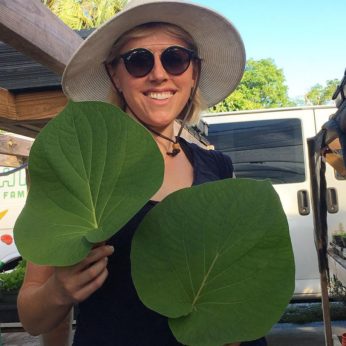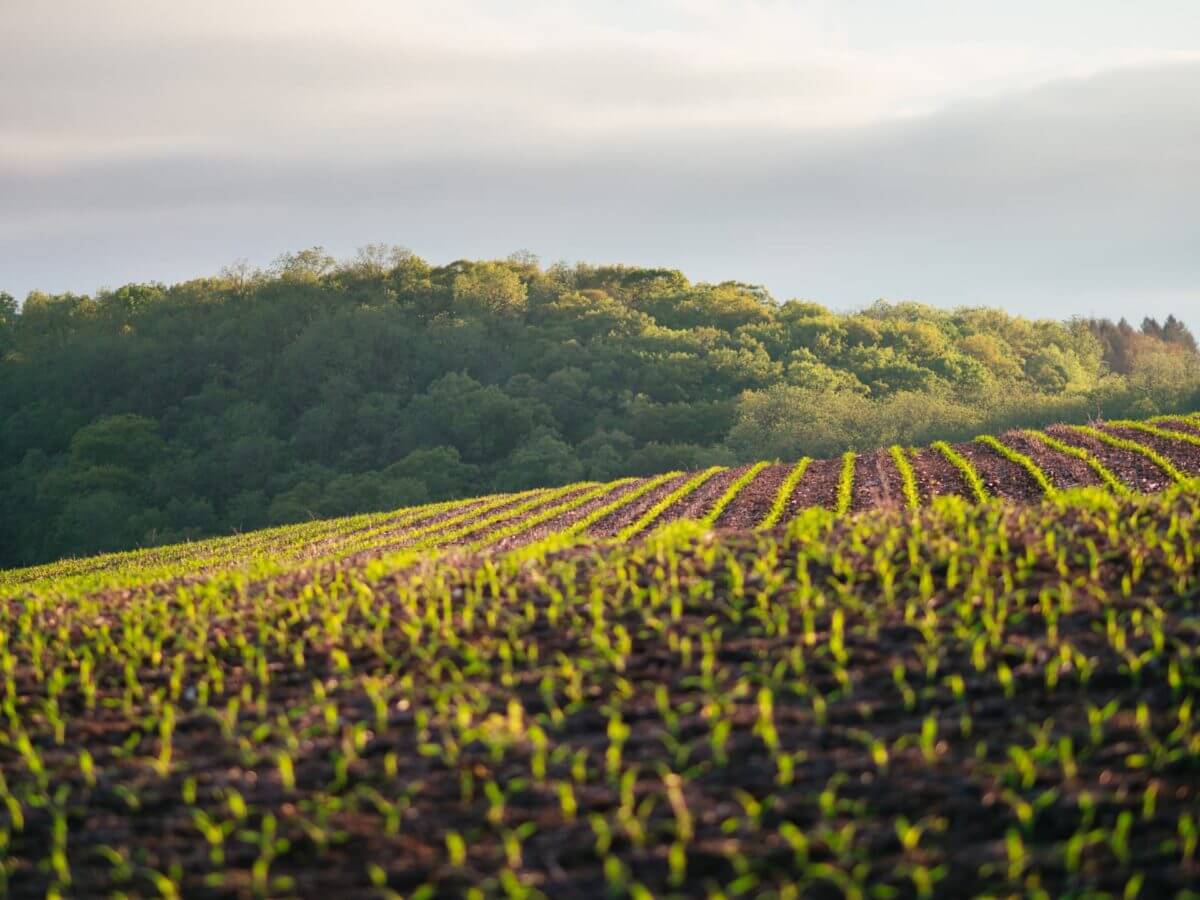Meet the Modern Farmers: Tamer and Claire Harpke of Harpke Family Farm
The Harpkes are part of a small yet growing movement of young farmers in South Florida.

Airplanes rumble over Harpke Family Farm in Dania Beach, Florida. When married couple Tamer and Claire Harpke founded the farm in 2014, they were nervous about it being in the flight path of a major airport. But its proximity to Fort Lauderdale–Hollywood International Airport has actually worked in their favor, making it easy for their main customers, including Miami chefs like Alter’s Seth Blumenthal and Kyu’s Michael Lewis, to visit.
“We start relationships on the farm,” explains Claire. “That’s our vetting process. We need people who are real partners — who care about what we do and see the value in it.”
This is the fourth year-round growing season for the young couple. They carefully tend to native Everglades tomatoes, Seminole pumpkins, microgreens and much more using organic growing practices on one packed acre. The farm is a meeting place for Girl Scouts, yogis and Slow Food fans. The Harpkes recently launched a farm-to-table dinner series with local chefs. Pedro, the farm dog, scares iguanas away while patrons eat at long, dark wooden tables under a Miccosukee chickee hut bordered by coconut-bearing palms. They also recently hosted a meeting of the international Social Gastronomy Movement, which fights social inequality and hunger through food.
Though they’re thinking globally, the Harpkes are part of a small yet growing movement of young farmers in South Florida. Little River Cooperative in Miami even has a small Urban Farmer Incubator program, in which they provide a plot of their land and mentor aspiring farmers. While other farms may focus on community-supported agriculture (CSA) and farmers’ markets, the Harpkes’ business mostly comes from high-end eateries.
The Harpkes built their business around connections made while working in the restaurant and boutique winery industries. Tamer, who has always had a green thumb, says that while he was on the road as a wine supplier, he saw award-winning restaurants embrace and take pride in knowing where their ingredients come from. “It broadened my perspective of the need for that to be the norm,” he says.
When Tamer’s mother suffered a debilitating stroke in 2012, he quit work to take care of her, driving two hours to Naples, Florida, several times a week. He started growing microgreens on her porch and eventually turned his backyard at home into a small farm. He met his farm landlord, who was cycling through tenants, at a farmers’ market. “Growing food is the easy part,” explains Tamer. “Selling food for a living is the hard part. But I was confident in two things: knowing how to grow plants and knowing how to build relationships.” So, Tamer and Claire took the leap. Now, four years later, they are expanding their clientele by working with specialty distributor Sunshine Provisions.
In 2017, when Harpke Family Farm was hammered by Hurricane Irma, the chefs of Recipe for Change hosted a fund-raiser to help them rebuild. The two were so grateful, they now share their time and produce with the homeless shelter Camillus House. In contrast to the chefs with great “tweezer game” that they frequently work with, “This lets us remember that it’s just produce,” says Claire.
While their young farm has experienced growing pains, the challenges it’s faced have matured its endeavors, lengthened its reach and shown what it looks like when the gastronomy and farm communities support each other fully.
MORE SOUTH FLORIDA FARMERS
South Florida has a flourishing and supportive network of young farmers who farm sustainably and are engaged in their surrounding communities.
Little River Cooperative For seven years, Tiffany Noe and Muriel Olivares of Little River Cooperative have grown and distributed food locally through their 130-person community-supported agriculture (CSA) program, restaurants and markets. They host workshops with mixologists who use their bitters to craft cocktails, offer chef-led pickling and have an Urban Farmer Incubator program to mentor aspiring farmers.
Health in the Hood Asha Loring launched the nonprofit Health in the Hood to help low-income residents in Miami’s food deserts eat more nutritiously by planting community-driven gardens and giving away the produce for free.
Mother Earth Miami Katia Bechara and Gabi Serra met through Little River Cooperative’s Urban Farmer Incubator program. With Mother Earth Miami, they cornered a niche market by creating a community-supported herbalist (CSH) program and offering herb- and mushroom-focused workshops.
Tree Amigos Growers Besides growing organic food and medicinal seedlings themselves, Jason Long and Santiago Arroyo of Tree Amigos Growers empower other urban growers in South Florida with consultations, workshops, installations and more.
Ground Floor Farm Jackie Vitale, Micah Hartman and city commissioner Mike Meier founded and run Ground Floor Farm, the only urban farm in Stuart, Florida. It also functions as an event space, a market and a chicken farm and is home to the Florida Ferment Fest.
Follow us
This work is licensed under a Creative Commons Attribution-NoDerivatives 4.0 International License.
Want to republish a Modern Farmer story?
We are happy for Modern Farmer stories to be shared, and encourage you to republish our articles for your audience. When doing so, we ask that you follow these guidelines:
Please credit us and our writers
For the author byline, please use “Author Name, Modern Farmer.” At the top of our stories, if on the web, please include this text and link: “This story was originally published by Modern Farmer.”
Please make sure to include a link back to either our home page or the article URL.
At the bottom of the story, please include the following text:
“Modern Farmer is a nonprofit initiative dedicated to raising awareness and catalyzing action at the intersection of food, agriculture, and society. Read more at <link>Modern Farmer</link>.”
Use our widget
We’d like to be able to track our stories, so we ask that if you republish our content, you do so using our widget (located on the left hand side of the article). The HTML code has a built-in tracker that tells us the data and domain where the story was published, as well as view counts.
Check the image requirements
It’s your responsibility to confirm you're licensed to republish images in our articles. Some images, such as those from commercial providers, don't allow their images to be republished without permission or payment. Copyright terms are generally listed in the image caption and attribution. You are welcome to omit our images or substitute with your own. Charts and interactive graphics follow the same rules.
Don’t change too much. Or, ask us first.
Articles must be republished in their entirety. It’s okay to change references to time (“today” to “yesterday”) or location (“Iowa City, IA” to “here”). But please keep everything else the same.
If you feel strongly that a more material edit needs to be made, get in touch with us at [email protected]. We’re happy to discuss it with the original author, but we must have prior approval for changes before publication.
Special cases
Extracts. You may run the first few lines or paragraphs of the article and then say: “Read the full article at Modern Farmer” with a link back to the original article.
Quotes. You may quote authors provided you include a link back to the article URL.
Translations. These require writer approval. To inquire about translation of a Modern Farmer article, contact us at [email protected]
Signed consent / copyright release forms. These are not required, provided you are following these guidelines.
Print. Articles can be republished in print under these same rules, with the exception that you do not need to include the links.
Tag us
When sharing the story on social media, please tag us using the following: - Twitter (@ModFarm) - Facebook (@ModernFarmerMedia) - Instagram (@modfarm)
Use our content respectfully
Modern Farmer is a nonprofit and as such we share our content for free and in good faith in order to reach new audiences. Respectfully,
No selling ads against our stories. It’s okay to put our stories on pages with ads.
Don’t republish our material wholesale, or automatically; you need to select stories to be republished individually.
You have no rights to sell, license, syndicate, or otherwise represent yourself as the authorized owner of our material to any third parties. This means that you cannot actively publish or submit our work for syndication to third party platforms or apps like Apple News or Google News. We understand that publishers cannot fully control when certain third parties automatically summarize or crawl content from publishers’ own sites.
Keep in touch
We want to hear from you if you love Modern Farmer content, have a collaboration idea, or anything else to share. As a nonprofit outlet, we work in service of our community and are always open to comments, feedback, and ideas. Contact us at [email protected].by Liz Tracy, Modern Farmer
November 19, 2018
Modern Farmer Weekly
Solutions Hub
Innovations, ideas and inspiration. Actionable solutions for a resilient food system.
ExploreExplore other topics
Share With Us
We want to hear from Modern Farmer readers who have thoughtful commentary, actionable solutions, or helpful ideas to share.
SubmitNecessary cookies are absolutely essential for the website to function properly. This category only includes cookies that ensures basic functionalities and security features of the website. These cookies do not store any personal information.
Any cookies that may not be particularly necessary for the website to function and are used specifically to collect user personal data via analytics, ads, other embedded contents are termed as non-necessary cookies.
